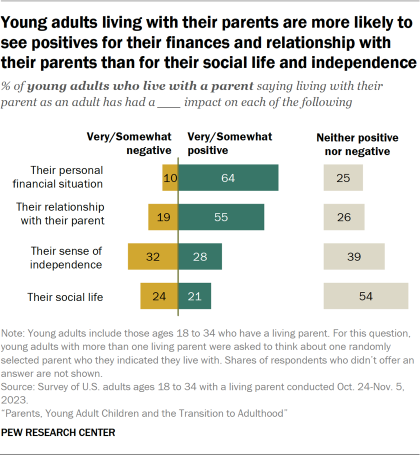Financial independence is a work in progress; few young adults say their parents are too involved in their day-to-day lives

Pew Research Center conducted this study to better understand the relationship between parents and their young adult children ages 18 to 34.
Most of the analysis in this report is based on two surveys conducted from Oct. 24 to Nov. 5, 2023. The first survey included 3,017 U.S. adults with at least one child age 18 to 34 who they have contact with (excluding any children currently enrolled in high school). The second survey included 1,495 adults ages 18 to 34 with at least one living parent who they have contact with (excluding any panelists currently enrolled in high school). The parents and young adults we surveyed were not part of the same family units.
Everyone who took part is a member of the Center’s American Trends Panel (ATP), an online survey panel that is recruited through national, random sampling of residential addresses. Address-based sampling ensures that nearly all U.S. adults have a chance of selection. The survey is weighted to be representative of the U.S. adult population by gender, race, ethnicity, partisan affiliation, education and other categories. Read more about the ATP’s methodology.
The report also includes an analysis comparing the experiences of young adults today and those of 30 years ago. College enrollment, college completion, labor force participation, wages, marriage, family and living arrangement estimates are derived from the 1993 and 2023 Current Population Survey (CPS). Mortgage and educational loan estimates use the 1992 and 2022 Survey of Consumer Finances (SCF) collected by the Federal Reserve Board.
Here are the question we asked parents of young adults and young adults ages 18 to 34, along with responses, and the report’s methodology.
Throughout this report, references to parents, mothers and fathers include only those who have at least one adult child age 18 to 34 who they are in contact with (excluding any children currently enrolled in high school).
References to young adults, sons and daughters include only those who are ages 18 to 34 with at least one living parent they are in contact with (excluding any panelists currently enrolled in high school).
“Middle income” is defined here as two-thirds to double the median annual family income for panelists on the American Trends Panel. “Lower income” falls below that range; “upper income” falls above it. Refer to the methodology for more details.
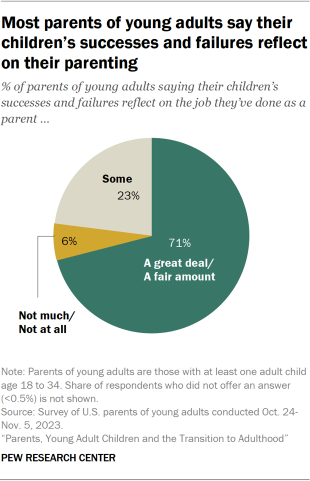
As parents watch their young adult children navigate the transition to adulthood, they’re feeling more proud and hopeful than disappointed or worried.
And they’re highly invested in how life turns out for their kids. Most parents of young adults (71%) say their children’s successes and failures reflect on the job they’ve done as parents. This is especially true of upper-income parents.
A pair of new surveys from Pew Research Center finds the lives of parents and their young adult children (ages 18 to 34) are closely knit together through emotional and financial ties.
Parents are very involved in their young adult children’s lives. Majorities say they text (73%) or talk on the phone (54%) with a young adult child at least a few times a week. About six-in-ten (59%) say they’ve helped their children financially in the past year.
Most young adults are fine with their parents’ level of involvement in their lives: 69% say their parents are about as involved in their day-to-day lives as they’d like them to be. About one-in-five (22%) say their parents aren’t involved enough, while only 9% say their parents are too involved. Majorities of young adults say they turn to their parents for advice at least sometimes on their jobs, finances and even their physical health.
In many cases, mothers stand out as particularly connected with their young adult children. Moms are in more frequent contact with their young adult children than dads are. And mothers are more likely than fathers to say their kids turn to them for advice extremely or very often. In addition, young adults are more likely to say they can be their true selves all or most of the time with their moms than to say the same about their dads. Moms and daughters are especially closely connected, with many relying on each other for emotional support.
Fewer than half of young adults ages 18 to 34 (45%) say they’re completely financially independent from their parents, though this differs widely by age. Among those who are not financially independent, most (75%) say they think they’ll eventually get there. And parents are similarly optimistic about this.
One-in-four parents (25%) say they track their young adult child’s location with GPS apps, even if only rarely. Most of the tracking is being done of 18- to 24-year-olds. Among parents answering about a child in this age range, 42% say they track their location. In addition, parents are more likely to say they track their daughters than their sons (31% vs. 21%).
This report explores the parent-child relationship and young adults’ experiences in early adulthood from several different angles:
The findings in this report come primarily from two surveys using Pew Research Center’s American Trends Panel. Both surveys were conducted from Oct. 24 to Nov. 5, 2023. The first included 3,017 adults with at least one child age 18 to 34. The second included 1,495 young adults ages 18 to 34 with at least one living parent. The two groups of respondents – the parents and young adult children – were not part of the same family units. The findings on young adults reaching key milestones (now versus 30 years ago) are based on an analysis of government data.
Relationships and emotional support
What parents say
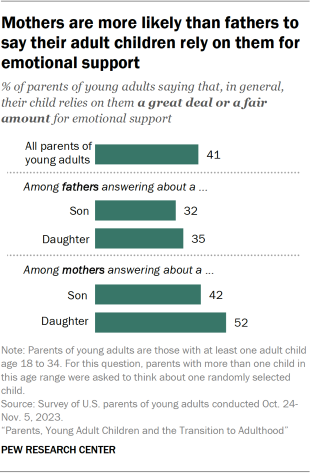
- 77% of parents say their relationship with their young adult children is excellent or very good. Moms rate the relationship more highly than dads, and upper- and middle-income parents give higher ratings than those with lower incomes.
- 41% of parents say their young adult children rely on them a great deal or a fair amount for emotional support. Moms are more likely than dads to say this. And moms are especially likely to say their daughters lean on them in this way (52% say this about their daughters vs. 42% about their sons).
What young adults say
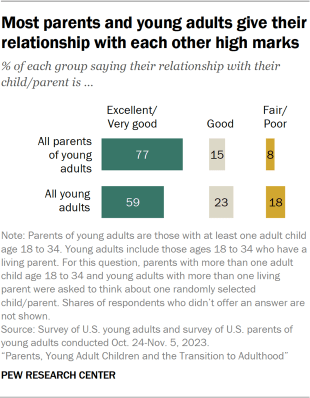
Turning to parents for guidance
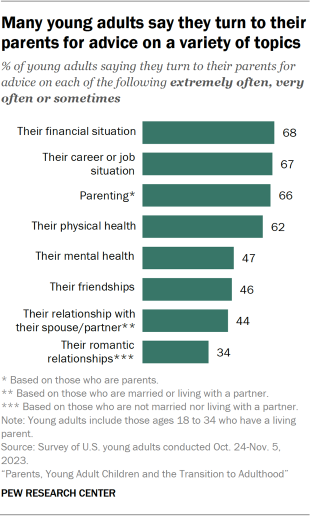
- Most young adults say they turn to their parents for advice on their jobs, finances and physical health at least sometimes. And a majority of young adults who are parents themselves say they seek parenting advice from their own moms and dads.
Smaller shares say they go to their parents for advice on their mental health, friendships or romantic relationships.
Adults ages 18 to 24 are the most likely to turn to their parents for advice at least sometimes about their job or career, physical health, and friendships.
The survey didn’t go into detail with parents about their own experiences when they were young adults. But one finding provides some insight into how things may have changed.
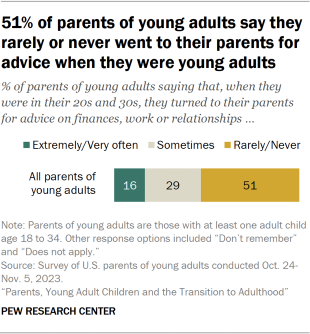
- 45% of parents say that, when they were in their 20s and 30s, they turned to their parents for advice on finances, work or relationships at least sometimes. By comparison, higher shares of today’s young adults say they go to their parents for career or financial advice at least sometimes, but a lower share say they seek advice from their parents on their romantic relationships.
Becoming an independent adult
What parents say
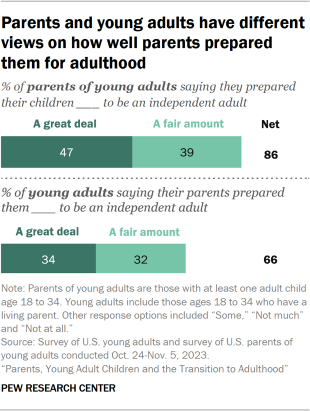
What young adults say
- 66% of young adults say their parents did at least a fair amount to prepare them to be independent adults, with 34% saying their parents did a great deal.
Among young adults, those with upper (85%) and middle incomes (73%) are more likely than those with lower incomes (53%) to say their parents did a great deal or a fair amount to prepare them to be independent adults.
Reaching the milestones of adulthood, then and now
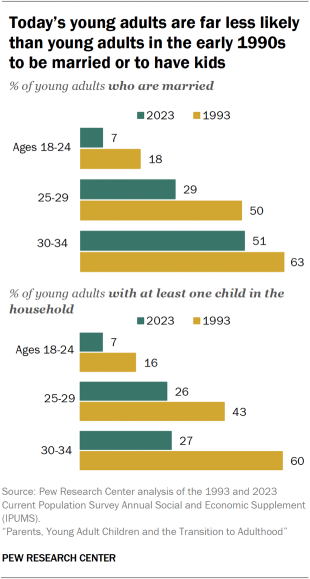
Today’s young adults are reaching key milestones later than young adults in their parents’ generation did in the early 1990s. A new analysis of government data shows clear differences in college completion, debt, marriage and having children.
- Young adults today are much more likely than their counterparts 30 years ago to be college graduates. They’re also more likely to have outstanding student loans.
- Young adults are more likely to be employed full time now than young adults in 1993. These increases have been driven by a larger share of women working full time (55% in 1993 vs. 67% today, among those ages 25 to 34).
- Today’s young adults are getting married much later than their parents’ generation. The gap in the share who are married is especially wide among young adults ages 25 to 29: 29% were married in 2023, compared with 50% in 1993.
- Young adults are also delaying having children. For example, 27% of adults ages 30 to 34 had a child in their household in 2023, compared with 60% in 1993.
Even as they delay marriage and parenthood, our survey finds that most young adults who have never been married (69%) say they want to get married someday.
A smaller share (51%) say they would like to have children someday (among those who don’t currently have children). Young men are more likely than young women to say they want to have children (57% vs. 45%).
About a third of young adults live with their parents
More young adults today live with their parents than in the past. Among those ages 18 to 24, 57% are living in a parent’s home, compared with 53% in 1993.
What parents say
